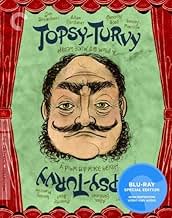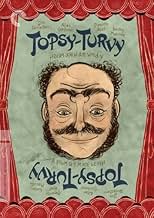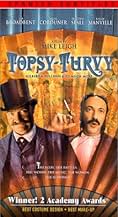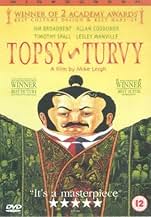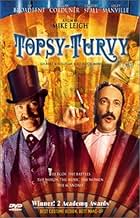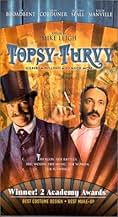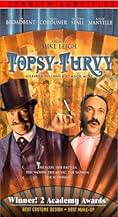Set in the 1880s, the story of how, during a creative dry spell, the partnership of the legendary musical/theatrical writers Gilbert and Sullivan almost dissolves, before they turn it all ar... Read allSet in the 1880s, the story of how, during a creative dry spell, the partnership of the legendary musical/theatrical writers Gilbert and Sullivan almost dissolves, before they turn it all around and write the Mikado.Set in the 1880s, the story of how, during a creative dry spell, the partnership of the legendary musical/theatrical writers Gilbert and Sullivan almost dissolves, before they turn it all around and write the Mikado.
- Won 2 Oscars
- 13 wins & 28 nominations total
Bill Neenan
- Cook
- (as William Neenan)
- Director
- Writer
- All cast & crew
- Production, box office & more at IMDbPro
Storyline
Did you know
- TriviaNot only did all the actors do their own singing, but everyone in the cast, including the pit orchestra and the actors who play instruments in the film, actually played the music they are seen to play.
- GoofsThis well known quote from the film is a factual mistake: "If you wish to write a Grand Opera about a prostitute, dying of consumption in a garret, I suggest you contact Mr Ibsen in Oslo. I am sure he will be able to furnish you with something suitably dull". The city of Oslo got the name in 1925 - a long time after Ibsen's death in 1906. During Ibsen's lifetime, the capital of Norway was called Kristiania.
- Crazy creditsThe credit for "Location Vehicles" is misspelled "Location Vechicles".
- SoundtracksIf You Give Me Your Attention
from "Princess Ida"
Music by Arthur Sullivan
Lyrics by W.S. Gilbert
Performed by Martin Savage and Chorus
Featured review
Mike Leigh's gloriously entertaining film, `Topsy-Turvy,' offers a wise and witty slice of musical theater history. Set in 1880's London, the movie chronicles the extraordinary personal and professional relationship between two giants of the 19th Century entertainment world, lyricist `Willie' Gilbert and composer Arthur Sullivan. The screenplay, wisely, chooses to pick up the tale not at the very beginning of their collaborative career - tracing its rise and fall as many biopics would do - but rather at the point where the team has already garnered international fame and success but seems of late to be experiencing a bit of creative stagnation. Sullivan, tiring of the seemingly trivial nature of the librettos they've been producing, wants to break away and embark on his own to produce a work of more `weighty' merit. Gilbert, on the other hand, delights in his success and, although bothered by comments in the press that his work has begun to repeat itself, initially resists Sullivan's plea that they abandon their hitherto winning formula.
Thus, the conflict between the two men of creative genius plays itself out against the fascinating backdrop of a deliciously recreated vision of the theatrical world of a hundred-odd years ago. Just as important to the film as the two main characters is the rich assortment of secondary players - theater proprietors, company actors, wives, lovers and parents - who swirl around the principals and provide a colorful tapestry to match the exquisite art direction and costuming that adorn the film. In addition, Leigh incorporates clever references to some of the technological marvels just making their appearance at the time: telephones, reservoir pens and luxury hotels with baths for every room!
Leigh's pacing is admirably unhurried and relaxed. So rich is the detail of his vision that fully thirty-five minutes elapse before the two lead characters even have their first scene together. In addition, the inspiration for `The Mikado' - ostensibly the centerpiece of the film's plot - doesn't strike Gilbert until well into the second hour. Yet, the film never falters in interest, least of all when Leigh devotes long stretches of footage to showing us the actors rehearsing their parts or having us eavesdrop on some behind-the-scenes salary negotiations or discussions of artistic differences. This is the real triumph of the film: Leigh opens up a world to us by letting us see the fascinating nuts-and-bolts aspects of the creative process to which we, as members of a theatre audience, are rarely privy. He also is not afraid to linger long over many a beautiful reproduction of the musical pieces themselves. Leigh can count his film a success in that it makes us want to rush out and catch a performance of one of these operettas ourselves.
The film would not be the splendid success it is were it not for the dazzling performances of its amazingly large cast. Jim Broadbent and Allan Corduner are perfection as the good-natured but often antagonistic partners, never playing the humor too broadly or violating the spirit of elite British gentility even in their most conflict-laden moments.
Indeed, it is this very quality of quiet subtlety that permeates every aspect of `Topsy-Turvy' and that makes it the wholly satisfying and entertaining film it is.
Thus, the conflict between the two men of creative genius plays itself out against the fascinating backdrop of a deliciously recreated vision of the theatrical world of a hundred-odd years ago. Just as important to the film as the two main characters is the rich assortment of secondary players - theater proprietors, company actors, wives, lovers and parents - who swirl around the principals and provide a colorful tapestry to match the exquisite art direction and costuming that adorn the film. In addition, Leigh incorporates clever references to some of the technological marvels just making their appearance at the time: telephones, reservoir pens and luxury hotels with baths for every room!
Leigh's pacing is admirably unhurried and relaxed. So rich is the detail of his vision that fully thirty-five minutes elapse before the two lead characters even have their first scene together. In addition, the inspiration for `The Mikado' - ostensibly the centerpiece of the film's plot - doesn't strike Gilbert until well into the second hour. Yet, the film never falters in interest, least of all when Leigh devotes long stretches of footage to showing us the actors rehearsing their parts or having us eavesdrop on some behind-the-scenes salary negotiations or discussions of artistic differences. This is the real triumph of the film: Leigh opens up a world to us by letting us see the fascinating nuts-and-bolts aspects of the creative process to which we, as members of a theatre audience, are rarely privy. He also is not afraid to linger long over many a beautiful reproduction of the musical pieces themselves. Leigh can count his film a success in that it makes us want to rush out and catch a performance of one of these operettas ourselves.
The film would not be the splendid success it is were it not for the dazzling performances of its amazingly large cast. Jim Broadbent and Allan Corduner are perfection as the good-natured but often antagonistic partners, never playing the humor too broadly or violating the spirit of elite British gentility even in their most conflict-laden moments.
Indeed, it is this very quality of quiet subtlety that permeates every aspect of `Topsy-Turvy' and that makes it the wholly satisfying and entertaining film it is.
- How long is Topsy-Turvy?Powered by Alexa
Details
- Release date
- Countries of origin
- Languages
- Also known as
- Mike Leigh Untitled
- Filming locations
- Richmond Theatre, 1 Little Green, Richmond, Greater London, England, UK(Savoy Theatre, London, England, UK)
- Production companies
- See more company credits at IMDbPro
Box office
- Budget
- £10,000,000 (estimated)
- Gross US & Canada
- $6,208,548
- Opening weekend US & Canada
- $31,387
- Dec 19, 1999
- Gross worldwide
- $7,804,439
- Runtime2 hours 40 minutes
- Color
- Sound mix
- Aspect ratio
- 1.66 : 1
Contribute to this page
Suggest an edit or add missing content




